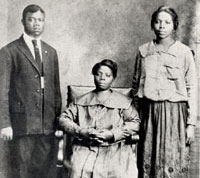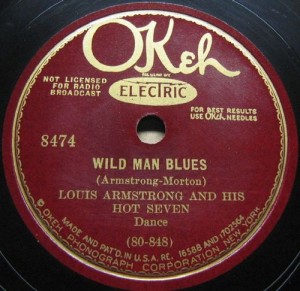.jpg)
Louis Armstrong. Photo courtesy songbook1.wordpress.
We know him for the glorious sound of his trumpet, his amazing improvised solos, and for his immediately recognizable gravel-laced voice. But what’s not so well known about Louis Armstrong is his way with words. Armstrong left behind a priceless legacy of expressive and enormously entertaining writing about his life and career in personal letters, journals and essays.
On this Riverwalk Jazz broadcast, the Obie award-winning actor Vernel Bagneris portrays the multitalented jazz artist in a script based on excerpts of Armstrong’s writing found in The Louis Armstrong Companion, published by Schirmer Books and edited by Joshua Berrett, and In His Own Words, published by Oxford University Press and edited by Thomas Brothers. New Orleans native Vernel Bagneris is acclaimed for his original Broadway shows Jelly Roll, A Me-morial and One Mo’ Time, for his many appearances in Hollywood movies (Pennies from Heaven with Steve Martin) and on television (HBO’s mini-series Treme) among others.

Vernel Bagneris. Photo courtesy of the artist.
Louis Armstrong: A Portrait of a Man & His Music was recorded for broadcast before a full house at the Crest Theatre as part of Sacramento’s annual Jazz Jubilee in 2000. The Jim Cullum Jazz Band, longtime disciples of Louis Armstrong, present a concert of tunes associated with their hero’s life in music.
Louis Armstrong’s genius speaks for itself, but musicians, critics and fans can’t help praising his artistry and the pure joy of his music. Duke Ellington referred to Armstrong as “Mr. Jazz” and called him “an American original.” Armstrong explained himself in far more modest terms saying, “It’s happiness to me to see people happy.”
Louis Armstrong was born in New Orleans on a poverty-stricken back street called Jane Alley where he lived with his mother “May Ann” and his sister “Mama Lucy.” His father disappeared from the scene shortly after Louis was born. In 1965 when health problems forced him to his hospital bed, Armstrong began to write his life’s story. He titled the opening chapter, “Louis Armstrong and the Jewish Family in New Orleans—the Year 1907.” He describes how at the age of seven, the Karnofsky family took him in, gave him a job in their coal business and a place at the family table. “I was real relaxed singing the song ‘Russian Lullaby’ with the Karnofsky family…they were always warm and kind to me, just a kid who could use a word of kindness, something a kid could use at seven, just starting out in the world. They could see that I had music in my soul. They really wanted me to be something in life. ”

Louis Armstrong with his mother "Mayann" and sister "Mama Lucy" (Beatrice) c.1922. Photo courtesy of louisarmstronghouse.org.
Louis’ fascination with music he heard on the streets of New Orleans as he delivered buckets of coal for the Karnosfsky family inspired him to save up what money he earned to buy his first horn, more a tin whistle or toy horn than a real instrument. It wasn’t long before he came under the influence of Joe ‘King’ Oliver, the reigning ‘cornet king’ of New Orleans. Louis describes Oliver’s generosity in helping him and other ambitious young players learn their craft. Throughout his life Louis would refer to ‘Papa Joe’ as his musical model. “I have played with quite a few musicians who weren’t so good. But as long as they could hold their instruments correct, and display their willingness to play as best they could, I would look over their shoulder and see King Oliver and several other masters from my hometown.”
.jpg)
Louis Armstrong and Lil Hardin. Photo courtesy of the Frank Driggs Collection.
Armstrong met his second wife Lil Hardin in the early 20s when they both were members of King Oliver’s band on the South Side of Chicago. Their marriage in 1922 was a surprise to the other band members. Armstrong wrote: “King Oliver was the first one to speak up. He said to me, ‘We all, meaning every member of my band, have been shootin’ at her, trying to make some kind of headway with her, and this country son of a bitch,’ meaning me, ‘comin’ up North makin’ a chick fall for him real deep.’ Then King said with one of his cute little smiles on his face, ‘More power to the both of you, son.’ All of a sudden, King Oliver and his entire band, they all yell at once, ‘Congratulations Mr. and Mrs. Satchmo Armstrong!’ —Oh, God!”
Louis Armstrong offers this remarkable statement of how he dealt with a life that began in New Orleans’ Back o’ Town neighborhood and wound up on the world stage. “My whole life has been happiness. Through all the misfortune I did not plan anything. Life was there for me and I accepted it. I never tried to prove nothing, just always wanted to give a good show.”
Broadcast Playlist Notes:
Unless otherwise indicated, Louis Armstrong composed the titles listed here.
“Oriental Strut“ from Louis Armstrong’s Hot 7. The Jim Cullum Jazz Band rendition heard on this broadcast begins with the original historical recording and crossfades into a live performance by the Band.
“S.O.L. Blues“ is one of Louis Armstrong’s Hot 5. The final chorus in the Cullum Band’s signature arrangement heard here is a harmonized transcription of Armstrong’s celebrated solo on the original disc.
“Two Deuces“ is a Hot 5 number from 1928 composed by Armstrong’s wife Lil Hardin Armstrong, the pianist with King Oliver’s Creole Jazz Band.
Jim Cullum and the Band perform the World War I pop song “It's a Long Way to Tipperary“ in the style of King Oliver’s band.
“Cornet Chop Suey“ dates from 1926 with the Hot 5.

"Wild Man Blues" record label. Image courtesy allmusic.
“Wild Man Blues“ was co-composed by Louis Armstrong and Jelly Roll Morton. Armstrong included it among his Hot 7 recordings in 1927.
“Struttin' with Some Barbecue,” composed by Lil Hardin Armstrong, is a Hot 5 from 1927.
“Mabel's Dream“ was composed by Ike Smith and recorded by King Oliver’s Creole Jazz Band with Louis Armstrong on second cornet for both the Okeh and Paramount labels in 1923.
“Put 'Em Down Blues” is a Hot 5 from 1927.
Photo credit for Home Page: Vernel Bagneris. Photo courtesy of the artist.
Text based on Riverwalk Jazz script by Margaret Moos Pick ©2000

